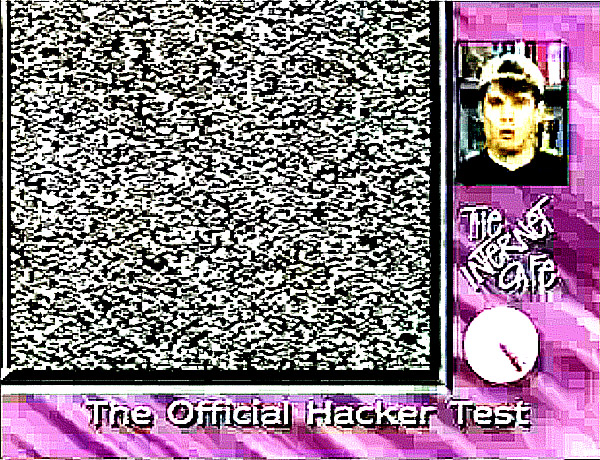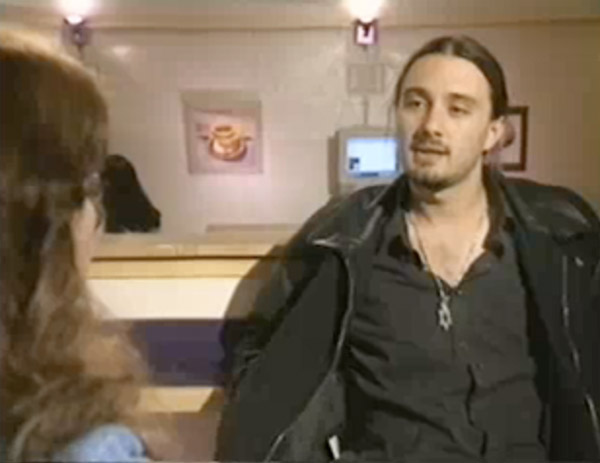The Anthropology of Hackers

Editor's Note: Pasty kids with greasy hair typing on command lines. Dark villains of the networked world. Security magicians with odd political beliefs. We have a lot of ideas about who hackers are, but very few people have actually tried to seriously investigate the anthropology of one of the more fascinating social groups to emerge at the end of the 20th century. NYU's Gabriella Coleman studies their culture, an odd brew of faith in freedom of information and traditional liberalism, along with a generous salt-and-peppering of nerdiness and counterculturalism. In the latest edition of our syllabus-as-essay series, Coleman guides us past the stereotypes and into the many hideouts and projects of the hacker underground.
A "hacker" is a technologist with a love for computing and a "hack" is a clever technical solution arrived through a non-obvious means. It doesn't mean to compromise the Pentagon, change your grades, or take down the global financial system, although it can, but that is a very narrow reality of the term. Hackers tend to value a set of liberal principles: freedom, privacy, and access; they tend to adore computers; some gain unauthorized access to technologies, though the degree of illegality greatly varies (and much, even most of hacking, by the definition I set above, is actually legal). But once one confronts hacking empirically, some similarities melt into a sea of differences; some of these distinctions are subtle, while others are profound enough to warrant thinking about hacking in terms of genres or genealogies of hacking -- and we compare and contrast various of these genealogies in the class, such as free and open source software hacking and the hacker underground.
Since 2007, I have taught an undergraduate class on computer hackers at New York University where I am Assistant Professor in the Department of Media, Culture and Communication. The class opens a window into the esoteric facets of hacking: its complicated ethical codes and the multifaceted experiences of pleasures and frustrations in making, breaking, and especially dwelling in technology. Hacking, however, is as much a gateway into familiar cultural and political territory. For instance, hacker commitments to freedom, meritocracy, privacy and free speech are not theirs alone, nor are they hitched solely to the contemporary moment. Indeed, hacker ethical principles hearken back to sensibilities and conundrums that precipitated out of the Enlightenment's political ferment; hackers have refashioned many political concerns -- such as a commitments to free speech -- through technological and legal artifacts, thus providing a particularly compelling angle by which to view the continued salience of liberal principles in the context of the digital present.
Week One: Introductions and the MIT Hackers
One of the canonical books on hackers is Steven Levy's superb journalistic account Hackers: Heroes of the Computer Revolution published in 1984. The book is famous for defining the "hacker ethic," a set of aesthetic and ethical imperatives that include a commitment to access, meritocracy, and a belief that computers can the be the basis for beauty, even a better world. While in a general sense, the hacker ethic can be said to exist -- in part because many hackers have adopted this terminology -- this benchmark at times acts as the Achilles heel of journalistic and academic studies of hackers; it is often invoked in simplified terms, applied wholesale to hackers whitewashing the most fascinating ethical dimensions that flow out of computer hacking, which are precisely the ethical eddies, cracks, and tides that render hacker action more ambivalent and ambiguous than a crystal clear standard.
Week Two: The Craft and Liberalism of Hacking
Hacking may be contemporary but the logic of its labor goes back centuries for it is a prime example of a "craft" as defined by the sociologist Richard Sennett in The Craftsman. Reading about craftsmanship helps students understand the material and social life of hacking. But in reading the pages of Levy, one also gets a whiff of an ideological scent among hackers, for example, in their hyper-elevation of meritocracy and individualism, both of which have a long and complicated life in the liberal tradition. Since liberalism becomes important in the course later and is hard to define, we start grappling with it early on and we lean heavily on Stuart Hall's piece, "Variants of Liberalism."
Week Three: Phreaking
The canonical (and I think misleading) story about hacking is that was born at MIT and evolved outward from there. Although MIT was certainly one place where hacking got its start, there were other genealogies in formation at the same time. We thus reappraise this version of history when we pay visit to another class of technologist, the phone phreakers -- the direct ancestors to the hacker underground. In the late 1950s, they started to study, explore, and enter the phone system by recreating the audio frequencies that the system used to route calls. To learn about these technological spelunkers of the phone system, we rely on a few of the early chapters in Bruce Sterling's The Hacker Crackdown and on Ron Rosenbaum's riveting Esquire article "Secrets of the Little Blue Box". The institutional independence of phreakers, in combination with some early political influences, such as the the Yippies (Youth International Party), made for a class of technologist whose aesthetic sensibilities and linguistic practices proved to be more daring, vivacious, audacious, and more transgressive than university-based hackers at MIT, Carnegie Mellon, and Stanford.
Week Four: Poor Man's ARPAnet (aka USENET) versus the Internet and the Politics of Technology
Hackers build technology that behaves not only technologically but also politically. To start thinking through this issue, we read one of the seminal pieces on the topic, Langdon Winners' "Do Artifacts have Politics." We use the framework to think about ARPAnet and its successor, the Internet, whose contradictory politics are laid out by Roy Rosenzweig in "Wizards, Bureaucrats, Warriors, and Hackers: Writing the History of the Internet." We also read Bryan Pfaffenberger, "If I Want It, It's OK: Usenet and the (Outer) Limits of Free Speech," as it covers some the earliest free speech battles that raged among hackers on USENET, battles that brought into relief the tension between elitism and populism that continues to be a defining mark of hacker sociality.

Week Five: The Hacker Underground and the Politics of Transgression
Phreaking was eventually eclipsed by what is commonalty referred to as the hacker underground, although for a period of time the two co-existed, a relationship signaled by one of the most popular e-zines in the history of hacking, Phrack, which my students read, along with textfiles, churned out in massive quantities by hackers. To learn about the underground, we read parts of Bruce Sterling's Hacker Crackdown as well one of the most definitive academic accounts on the subject Hacker Culture by Douglas Thomas. We supplement this material with a short piece by Dick Hebdige -- Threats, Striking... Poses -- as a way to understand how transgressive subcultures derive pleasure in performing the spectacle that is expected of them.
Weeks Six and Seven: The Politics of Free and Open Source Software
Perhaps one of the most important political interventions made by hackers is through the production of Free and Open Source Software (such as the web browser Firefox and the GNU/Linux Operating System). We start with the intellectual progenitor of Free Software, uber-hacker Richard Stallman. We read the "GNU Manifesto" published in 1985 where he proposes his philosophical and practical vision for Free Software. To get students up to speed about the fraught three hundred year history of intellectual property law, we read Carla Hesse's magnificent "The Rise of Intellectual Property, 700 B.C - A.D. 2000: an Idea in Balance" -- a gem for its ability to convey so much in such economical terms. Finally, we rely heavily on Chris Kelty's excellent account: Two Bits: The Cultural Significance of Free Software.
Week Eight: The Aesthetics and Politics of Code
Free and Open Source Software is about software, specifically source code, the underlying directions written by programmers and powering software. But what is code? What are its politics? To acquaint ourselves with the material and aesthetic properties of software, we read a handful of chapters from Software Studies by Mathew Fuller. We then move more squarely to the politics of code with Lawrence Lessig's piece "Open Code and Open Societies" as well "Code is Speech: Legal Tinkering, Expertise, and Protest among Free and Open Source Software Developers" based on my fieldwork with Free Software developers.
Week Nine: Encryption, Privacy, and Anonymity
Many hackers are concerned with privacy, some dedicating their lives to building and refining encryption software that can ensure privacy or anonymity. To get a bit of this history down, we read Steven Levy's "Crypto Rebels" and "How PGP Works/Why Do You Need PGP?" by Phil Zimmerman, the maker and liberator of one of the most famous pieces of encryption software (PGP stands for Pretty Good Privacy). We top things off with Cory Doctrow's novel Little Brother, which hits many flagship issues concerning privacy and encryption. Finally, I have students visit the Tor project website to acquaint themselves with a contemporary and vibrant Free Software project that makes software that helps ensure privacy and security.
Week Ten: The Pleasure of Creation
By the time we reach this point in the class, one thing is certain: hackers are obsessed creatures, motivated by the deep pleasures of hacking, learning, sharing, and for some, transgressing. We spend a week exploring the multi-facted, even kaleidoscopic, nature of pleasure. Martha's Nussbaum's short article -- "Mill between Aristotle & Bentham" -- introduces students to the theory of eudaimonia. First defined by Aristotle, eudaimonia identifies happiness as form of human flourishing, secured through the unfolding of human capacities, a version of pleasure quite common among Free Software developers. We read excerpts of Nietzsche's Birth of Tragedy and Roland Barthes' The Pleasure of the Text (which students tend not to find all the pleasurable) to get a taste of the more blissful, hedonistic, and Dionysian features of pleasure that can also mark many instances of hacking and especially transgression.

Many hackers express some degree of ambivalence over the politics of hacking as Patrice Riemens has argued and as hackers themselves have raised. This is not the case with a small but well organized cadre of hackers located primarily in Latin America, Europe, and North America who have charted collectives, many of them influenced by the political philosophy of anarchism. To grapple with anarchism as a political philosophy (which, similar to hacking, is plagued with a parade of misconceptions), we turn to David Graeber's fantastic pamphlet, Fragments of an Anarchist Anthropology. We also read Jeff Juris's ethnographic work about technology activists during the counter-globalization era Networking Futures.
Week Twelve: Trolls and the Politics of Spectacle
If anyone has been paying attention to the Internet in recent years, it has been impossible to miss a class of provocateur and saboteur: the Internet troll, whose raison d'être is to be as offensive as humanely possible via raunchy (but often humorous and quite esoteric) language, images, pranks, and tricks, basically, doing it for what they call the "lulz." To get a sense of the cultural logic and exploits of trolls we read "The Trolls Among Us" by Mattathias Schwartz. To help us grapple with the nature of spectacle, we read a couple of chapters of Dream: Re-imagining Progressive Politics in an Age of Fantasy by Stephen Duncombe. We read excerpts from Lewis Hyde's magnificent book on tricksters to consider whether the troll might be an example of these mythical creatures that have dazzled countless societies with their trickery. We watch a talk on a protest movement against the Church of Scientology whose roots lie in the act of trolling but eventually turned into a morally serious protest movement, which nonetheless retained the tactics of spectacle as part of its political arsenal.
Week Thirteen: Nerds
Not all hackers are nerds but nerdiness does seem to crop up an awful lot among hackers (although many hackers grow out of nerdiness to become "geeks"). What does it mean to be a nerd? Where did the term even come from? What is the history of nerdom and its relationship to other ethnic groups? Benjamin Nugent's account American Nerd, The Story of my People is the way to get at these questions and issues, which we then apply to computer hackers. The book is a real hit with the students, probably because it is jargon free yet conceptually quite rich.
What's not there (and sometimes there):
A lot. As outlined, the course does not address many important instances and dimensions of hacking, and to conclude, I would like to gesture at some of this material. First, there is very little written about the information security scene but I point my students to some blog entries and references to it in hacker zines or talks. There is not all that much material on hacking and Free Software outside of North America and Europe but the literature is growing and I plan on including it in the future. We always bring in many current events, for example, the spring of 2010, discussing Wikileaks in considerable detail and I show all sorts of video clips in class. Every year I tend to include some themes and issues, not included above. One theme is the hacker in the workplace and we read Scott Rosenberg's excellent Dreaming in Code. Finally, I often teach a section on gaming, assigning a chapter from Levy's Hackers covering the creation of one of the first video games, Spacewar and assign Julian' Dibbell's first hand account on the economies of virtual world, Play Money.
Author image: Riana Pfefferkorn.
Images: Screen captures from the television show Net Cafe during its show 1996 program on hackers. Stored on Archive.org.